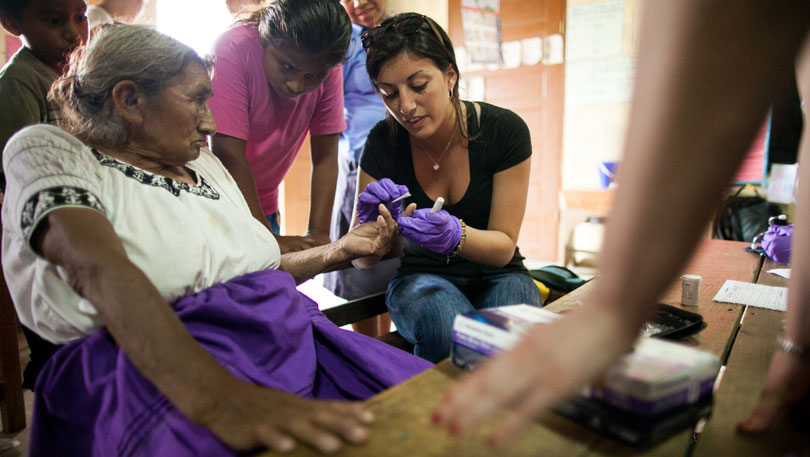Coursework & Degree Requirements
 By the time of graduation from the bachelor’s degree program, and as a condition of entry into the School of Public Health, students must have successfully completed the following core courses for the MPH program, according to the SPH Grading Policy.
By the time of graduation from the bachelor’s degree program, and as a condition of entry into the School of Public Health, students must have successfully completed the following core courses for the MPH program, according to the SPH Grading Policy.
These 16 credits of graduate-level School of Public Health coursework will be completed in the last two years of undergraduate study and applied to both the BS and MPH degrees:
SPH PH717: Quantitative Methods for Public Health
Public health is an evidence-based discipline. Understanding the distribution and determinants of disease and engaging in prevention efforts requires the ability to collect, analyze, and communicate quantitative data. This course equips students with essential quantitative skills to evaluate data and make informed, evidence-based decisions as public health professionals. Students will gain core training in epidemiologic study design, basic biostatistical analysis, the use of statistical software, and foundational knowledge in exposure and outcome assessment. (Credits: 4)
SPH PH718: Leadership and Management for Public Health
Public health professionals engage with individuals, groups, communities, and systems, requiring strong leadership and management skills to achieve their goals. Leadership involves influencing, motivating, and empowering others to share a vision, while management focuses on organizing, coordinating, and facilitating activities. Both are essential in public health practice. This course is a hands-on seminar designed to provide practical tools and strategies for effective public health leadership and management. Students will explore primary levels of interaction and develop skills that apply across different levels and settings. (Credits: 4)
SPH PH719: Health Systems, Law, and Policy
Policies and laws strongly influence health outcomes at individual and population levels. This course examines the constitutional, regulatory, policy, and socio-economic foundations for federal and state policies that determine access, quality, cost, and equity in health services and population health programs. Students gain a comprehensive understanding of processes from policy development through implementation in the public and private sectors. While the course primarily focuses on U.S. examples, it complements the World Health Organization’s framework for organizing and analyzing national health systems. (Credits: 4)
SPH PH720: Individual, Community, and Population Health
Public health is shaped by overlapping social, economic, and environmental forces. This course uses various conceptual frameworks and theories to explore the root causes of individual choices and behaviors and their impacts on health, vulnerability, and illness. Students will learn to identify effective intervention strategies, such as advocating for legal and policy changes, addressing social inequities, implementing targeted programs that meet community needs, and persuading individuals to change their lifestyles. Additionally, students will learn the art and science of designing and implementing evidence-based approaches to collaborate with communities and health professionals to improve health outcomes, reduce vulnerability, and address the structural foundations of inequity. (Credits: 4)
Course Planning
Once accepted into the BS/MPH program, students are required to meet with the Director of Undergraduate Education and/or with Assistant Director of Advising at the School of Public Health to plan their public health courses. Proactive planning is essential for timely completion of all MPH requirements. The tentative schedule of courses should then be reviewed with the student’s undergraduate faculty advisor at Sargent College.
At the completion of the BS degree requirements (128+ credits) at Sargent College, the Bachelor of Science degree will be awarded. At the end of the fifth year or a minimum of 32+ additional credits of SPH coursework, the Master in Public Health degree will be awarded.
Careful planning and full-time enrollment can result in students’ receiving the MPH after a total of five years of study, rather than the usual minimum of five-and-a-half years. Students may complete the MPH degree on a part time basis if desired.
 By the time of graduation from the bachelor’s degree program, and as a condition of entry into the School of Public Health, students must have successfully completed the following core courses for the MPH program, according to the SPH Grading Policy.
By the time of graduation from the bachelor’s degree program, and as a condition of entry into the School of Public Health, students must have successfully completed the following core courses for the MPH program, according to the SPH Grading Policy.